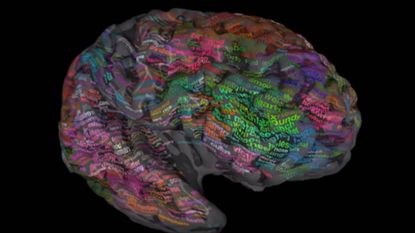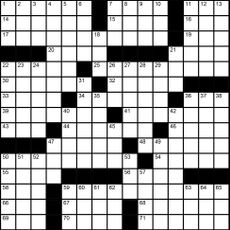'Neural atlas' of the brain shows how we process words
New map could allow for instantaneous language translation in the future

Scientists have created a "neural atlas" of the brain that shows how the meanings of words correspond to different regions.
The map, created by neuroscientists at the University of California, Berkeley, displays how each word triggers reactions in specific parts, turning spoken language into intricate patterns of meaning.[[{"type":"media","view_mode":"content_original","fid":"94238","attributes":{"class":"media-image"}}]]
"Our goal was to build a giant atlas that shows how one specific aspect of language is represented in the brain, in this case semantics, or the meanings of words," said researcher Jack Gallant.
Subscribe to The Week
Escape your echo chamber. Get the facts behind the news, plus analysis from multiple perspectives.

Sign up for The Week's Free Newsletters
From our morning news briefing to a weekly Good News Newsletter, get the best of The Week delivered directly to your inbox.
From our morning news briefing to a weekly Good News Newsletter, get the best of The Week delivered directly to your inbox.
Scientists recorded the brain activity of English-speaking volunteers while they listened to stories read out on The Moth Radio Hour, a US radio show. They then cross-referenced the words of the stories with the brain activity of each participant to show how groups of similar words triggered similar responses in more than 50,000 pea-sized spots all over the brain.
They believe that the map could allow clinicians to track the neural activity of patients who have difficulty communicating and then match that data to semantic language maps to determine what they are trying to express. It could also potentially allow for an implant that decodes brain signals into different languages as a person speaks.
"It is possible that this approach could be used to decode information about what words a person is hearing, reading or possibly even thinking," said study author Alexander Huth.
"Described as a 'tour de force' by one researcher who was not involved in the study, the atlas demonstrates how modern imaging can transform our knowledge of how the brain performs some of its most important tasks," says The Guardian.
"The data is certainly intriguing," Susan Bookheimer, a neuroimaging expert in Los Angeles, told The Wall Street Journal. "It's suggestive, but much more work is needed to understand what it means."
Create an account with the same email registered to your subscription to unlock access.
Sign up for Today's Best Articles in your inbox
A free daily email with the biggest news stories of the day – and the best features from TheWeek.com
-
 Magazine interactive crossword - May 3, 2024
Magazine interactive crossword - May 3, 2024Puzzles and Quizzes Issue - May 3, 2024
By The Week US Published
-
 Magazine solutions - May 3, 2024
Magazine solutions - May 3, 2024Puzzles and Quizzes Issue - May 3, 2024
By The Week US Published
-
 Magazine printables - May 3, 2024
Magazine printables - May 3, 2024Puzzles and Quizzes Issue - May 3, 2024
By The Week US Published
-
 Nigeria's worsening rate of maternal mortality
Nigeria's worsening rate of maternal mortalityUnder the radar Economic crisis is making hospitals unaffordable, with women increasingly not receiving the care they need
By Harriet Marsden, The Week UK Published
-
 Dengue hits the Americas hard and early
Dengue hits the Americas hard and earlySpeed Read Puerto Rico has declared an epidemic as dengue cases surge
By Peter Weber, The Week US Published
-
 How happy is Finland really?
How happy is Finland really?Today's Big Question Nordic nation tops global happiness survey for seventh year in a row with 'focus on contentment over joy'
By Harriet Marsden, The Week UK Published
-
 How Tehran became the world's nose job capital
How Tehran became the world's nose job capitalUnder the radar Iranian doctors raise alarm over low costs, weak regulation and online influence of 'Western beauty standards'
By Harriet Marsden, The Week UK Published
-
 Africa's renewed battle against female genital mutilation
Africa's renewed battle against female genital mutilationUnder the radar Campaigners call for ban in Sierra Leone after deaths of three girls as coast-to-coast convoy prepares to depart
By Harriet Marsden, The Week UK Published
-
 Argentina: the therapy capital of the world
Argentina: the therapy capital of the worldUnder the radar Buenos Aires natives go hungry to pay for psychoanalysis, amid growing instability, anxiety – and societal acceptance
By Harriet Marsden, The Week UK Published
-
 Does declining birth rate spell doom for Britain?
Does declining birth rate spell doom for Britain?Today's Big Question Ageing population puts pressure on welfare state, economy and fabric of society, while fertility is rising on populist agendas
By Harriet Marsden, The Week UK Published
-
 How a new blood test could revolutionise sepsis diagnosis
How a new blood test could revolutionise sepsis diagnosisThe Explainer Early results from ongoing trial suggest faster identification of deadly condition is possible
By The Week Staff Published